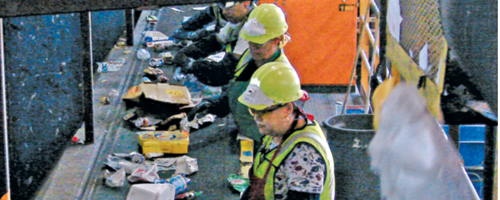Bay Area non-profit has devised a strategy to increase corporate accountability and overhaul socially irresponsible business practices and, in the process, better ensure the safety of both consumers and the environment.

By Bill Picture
Published: May, 2008
In 1992, San Francisco-based As You Sow set out to clean up the retail marketplace by going after manufacturers whose products contained carcinogenic ingredients. As You Sow did this on behalf of California consumers, who are guaranteed protection under the state’s Safe Drinking Water and Toxic Enforcement Act. In some cases, not only has As You Sow been able to get the companies to reformulate their products, it has also collected monetary damages, which it then doles out to other organizations fighting the good fight in the form of grants.
One of As You Sow’s environmental enforcement program’s earliest successes was convincing nearly 50 major cosmetics brands, including Revlon and Maybelline, to remove cancer-causing toluene and formaldehyde from their nail-care products. More recently, As You Sow set its sights on mobile classrooms, which are being moored in the parking lots of the state’s public schools to accommodate student populations that are growing at an exponential rate. After bringing to the attention of decision-makers in Sacramento that these trailers often contained unsafe levels of known carcinogens, including formaldehyde—used in some wood paneling, ceiling tiles, flooring and glue—the State committed to reduce the levels of these chemicals by 80 percent.
And, at As You Sow’s urging, Apple is now working to phase out the use of heavy metals in computer components, along with toxic chemicals in the plastics used to make computer shells. We approached Steve Jobs last year with a list of nine demands, and things got pretty heated, says Larry Fahn, executive director of As You Sow. But they eventually committed to all of them. And they’re moving forward on those promises and have clearly made some progress.
It didn’t take long for As You Sow, which is funded through a combination of grant money and private donations, to figure out that the most effective tactic for changing an organization’s corporate behavior—from making safer products to implementing greener business practices—is to enlist the support of shareholders who share the non-profit’s concern for consumer safety and environmental protection. These investors, Fahn says, are quickly becoming consumers’ and the environment’s best friend.
A growing number of them are finding that they can invest socially responsibly, and that it won’t impact the return on their investment. In 1999, As You Sow approached Home Depot to ask that the company cease its practice of selling lumber harvested from old growth forests. On their own, As You Sow’s request most likely would have been ignored. But, because the organization represented a group of Home Depot shareholders who opposed deforestation, along with a network of grassroots organizations who picketed outside Home Depot stores and offices, Home Depot had to listen. Between pressure from its shareholders and the threat of a public relations nightmare, Home Depot, after some resistance, announced a three-year phase-out of wood products harvested from endangered forests.
If you can get 3 percent of the votes, that’s usually considered high, Fahn explains. We got 12 percent at Home Depot. So that was a huge victory. And it gave [As You Sow] some instant credibility. Naturally, Home Depot took all the credit, marketing the idea as its own. Still, the decision prompted competitors within the home improvement community, such as Lowe’s, to follow suit.
In the case of Apple, As You Sow employed a similar tactic, rallying the support of socially responsible shareholders to get the computer giant to commit to tripling its recycling efforts for old Macintosh computers, to avoid those computers ending up in landfills. The biggest challenge is making the economic case, Fahn says. You have to prove that doing the right thing will also help the company’s bottom line.
As You Sow was able to cite the success of similar recycling programs at Hewlett-Packard and Dell to help make its case to Apple. Fahn says he encountered resistance at both of those companies at first as well. But a little number-crunching showed that the companies stood to make a nice chunk of change by taking back the old computers and recycling the materials. And that helped us convince Apple to do the same, Fahn adds.
Lately, Fahn has been looking closely at the number of televisions destined for the waste stream as consumers replace their old tube models with flashy digital televisions.
What we’d like to do is convince the Circuit Citys and Best Buys of the world to take back the old televisions. Then, it would be the responsibility of the manufacturer to collect the televisions and recycle the parts.
He’d also like to see the beverage industry take a similar extended producer responsibility, by having Coca-Cola, for instance, share the responsibility of recycling plastic bottles with consumers by paying to build more plastic recycling facilities.
The idea is, if a company knows it’s going to have to take back the product and be responsible for properly disposing of it, then they’ll be more savvy about the way they put together new products, explains Conrad McKerron, the director of As You Sow’s corporate social responsibility program.
A growing awareness within the corporate community of the benefits of green business practices is making As You Sow’s job a tiny bit easier. Still, McKerron says that the bar has yet to be set for how green is green enough. I think companies are trying to be much more green, he says. The problem is, no one is really sure what that means. There’s only limited government regulation, and there’s no uniform corporate responsibility reporting. So companies get to self-define what sustainable is.
And that self-set bar, McKerron says, often falls short of a company’s potential for sustainability. So we come along and say, ‘What you’re doing now is great, but here’s what else you can do.’ We recognize and praise their efforts, and try to be a catalyst.
As You Sow’s Key Successes
1. Arguing that Genetically Engineered (GE) foods have not undergone sufficient testing to ensure their safety, As You Sow convinces big-name food companies, including Heinz and Hershey, to reduce or remove GE ingredients from certain product lines.
2. Coca-Cola and Pepsi agree to increase the recycled content of single-serving plastic bottles by 10% to offset a nationwide decline in recycling rates.
3. Computer manufacturers HP, Dell and Apple agree to take back obsolete equipment from customers and recycle materials to reduce e-waste otherwise headed for landfills. Apple is also looking into removing toxic ingredients from the plastic used for its monitors and keyboards.
4. Staples agrees to phase out all paper products sourced from endangered forests and sets a goal of 30% recycled content for paper products sold in its stores.
5. Several manufacturers of herbal supplements agree to pull product lines containing high levels of heavy metals, such as lead, from store shelves and reduce exposure levels in other products to ensure consumer safety.
6. Home Depot agrees to stop selling lumber harvested from old growth forests.
For more information on As You Sow, visit www.asyousow.org
Home Depot is one of many large corporations that As You Sow works with to increase corporate accountability. Photo by Joel Williams

Currently, As You Sow is putting pressure on the beverage industry to share the responsibility of recycling the plastic bottles that they produce. Photo courtesy of Waste Management

